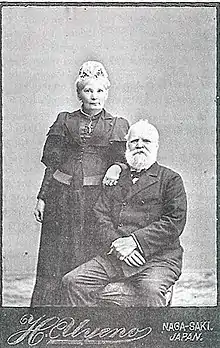John Chalmers (1825–1899) was a Scottish Protestant missionary in late Qing Dynasty China and translator.[1] His work An English and Cantonese Pocket Dictionary (1859) popularized the term "Cantonese".[2] Before 1859, Cantonese was referred in English as "the Canton dialect".[3][2]
Chalmers served with the London Missionary Society. He wrote several works on the Chinese language, including, in 1866, the first translation into English of Lao Tzu's Tao Te Ching (which he called the Tau Teh King).
John Chalmers | |
|---|---|
 Chalmers and his wife Helen, taken in Nagasaki | |
| Born | 24 October 1825 New Deer, Aberdeenshire, Scotland |
| Died | 22 November 1899 (aged 74) Incheon, South Korea |
| Spouse |
Helen Morison
(m. 1852; died 1897) |
Works
- Chalmers, John (1855). "A Chinese Phonetic Vocabulary, Containing all the most common characters, with their sounds in the Canton Dialect". Hong Kong: London Missionary Society's Press.
{{cite journal}}: Cite journal requires|journal=(help)[4] - John Chalmers (1859). An English and Cantonese pocket dictionary: for the use of those who wish to learn the spoken language of Canton Province. Printed at the London Missionary Society's Press. p. 159. Retrieved 2011-07-06.
- Chalmers, John (1866). Origin of the Chinese. Hong Kong: De Souza & Co.
- John Chalmers (1868). The Speculations on Metaphysics, Polity and Morality of "The Old Philosopher," Lau-tsze. London: Trubner. p. 62. Retrieved 2013-01-20.
- John Chalmers (1882). An account of the structure of Chinese characters under 300 primary forms: after the Shwoh-wan, 100 A.D., and the phonetic Shwoh-wan, 1833. Trübner & co. p. 199. Retrieved 2011-07-06.
References
- American Presbyterian Mission (1867). Memorials of Protestant Missionaries to the Chinese. Shanghai: American Presbyterian Mission Press.
- Broomhall, Alfred (1982). Hudson Taylor and China's Open Century: Barbarians at the Gates. London: Hodder and Stoughton.
Notes
- ↑ Gerald H. Anderson (1999). Biographical Dictionary of Christian Missions. Wm. B. Eerdmans Publishing. p. 123. ISBN 978-0-8028-4680-8.
- 1 2 Kataoka, Shin; Lee, Yin-Ping Cream (2022). 晚清民初歐美傳教士書寫的廣東話文獻精選 (PDF). Chinese University of Hong Kong. p. 25.
- ↑ "Han-fung's Record". The Sacred Edict: Containing Sixteen Maxims of the Emperor Kang-Hi. Translated by Milne, William. 1817. pp. xxvii–xxviii. Archived from the original on 2007-04-30.
bought with him the Paraphrase on the Sacred Edict [廣訓衍]... This interpretation was written in the northern dialect, ... on the first and fifteenth of the each moon, they might proclaim the original text in the Canton dialect.
- ↑ Kataoka, Shin; Lee, Cream (2008). "A System without a System: Cantonese Romanization Used in Hong Kong Place and Personal Names". Hong Kong Journal of Applied Linguistics 11,1: 79–98.
External links
- Works by John Chalmers at LibriVox (public domain audiobooks)

This article is issued from Wikipedia. The text is licensed under Creative Commons - Attribution - Sharealike. Additional terms may apply for the media files.